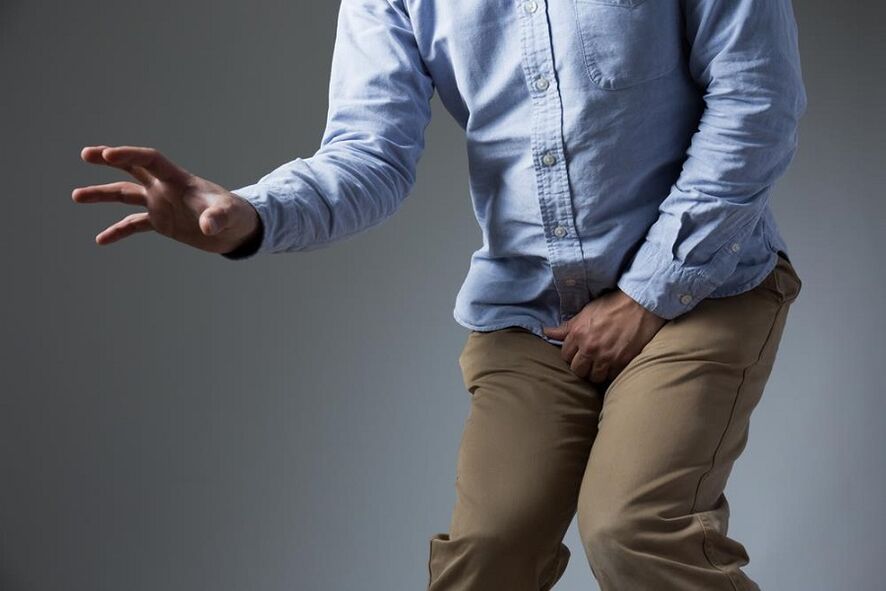Prostatitis is the most common male disease and is very insidious.Prostatitis often develops in a chronic form precisely because its first symptoms remain unnoticed.They can be expressed to various degrees, appear alone or more at the same time.One thing is important: you must know them to recognize and consult a doctor in time.
Symptoms of acute prostatitis

In most cases, the clinical picture of acute prostatitis is very similar.Of course, there may be individual characteristics, but they do not prevent an experienced doctor from accurately recognizing the enemy.The signs are customary to divide into groups:
General manifestations
- Increased temperature, most often significant.
- Decree: weakness, discomfort, fatigue, decrease in the level of physical activity.Consequently, a decrease in performance.
- Laboratory indicators: The results of blood and urine tests point out the presence of an inflammatory process.
All of these characteristics are not unique for prostatitis - this is how inflammatory diseases of other small basins can manifest.The image becomes much more clearly with the appearance of local symptoms.
Local symptoms
- Discomfort in the groin.It appears with physical or sexual activity, after a while at rest.The discomfort manifests in the form of itching, burns, feelings of burst in the groin or in the urethra.
- Pain in the perineum, groin, testicles.Differentity is developing rapidly in pain syndrome.Its intensity is proportional to the intensity of the inflammatory process and can even indicate what infection the cause of prostatitis is.
- Mucous discharge.Transparent or whitish, appear at the initial stage.Testify to the inflammation pronounced.
- A mixture of blood.Most often found in the form of hematospermia - coloration ejaculated by blood or at the end of the urination.Sometimes spontaneous mucous secretions with a mixture of blood are possible.
- Constipation.Due to anatomical proximity, inflammation of the prostate gland also affects gastrointestinal tract.
- Difficult urination.It originally manifested by an incomplete emptying of the bladder and the need to push.Then there is a weakness of the urinary flow, which can be transformed into the impossibility of an independent urination when filled with bladder.
Intimate disorders

Often, it is precisely the problems of the intimate sphere that are the most painful for men.Prostatitis progressive gradually causes a decrease in sexual activity, weakens libido.Psychological problems join physical problems and, together, they inevitably lead to an erectile dysfunction.
Chronic prostatitis symptoms
In the exacerbation phase, clinical manifestations are similar to the symptoms of acute prostatitis.In the remission phase, certain violations expressed to various degrees are present.As a rule, symptoms are more erased.
Asymptomatic form
Asymptomical prostatitis - The phenomenon is quite rare.The disease takes place for a long time without characteristic symptoms: no pain, no urination problems, there is no weakness, the temperature is normal.This happens if immunity is high.With a decrease in immunity, the characteristic symptoms of prostatitis are beginning to manifest.
The absence of body signals interferes with a timely diagnosis and, therefore, by successful treatment.Such prostatitis is detected by accident.This is why it is important to regularly undergo a medical examination, even if nothing arises.
Treatment characteristics
Most importantly: no self-medication!Only a doctor (urologist, andrologist) based on patient complaints, examination, various analyzes and examinations can establish a precise diagnosis.
In the case of acute prostatitis, the purpose of therapy is the complete remedy and the prevention of the transition of the disease in a chronic form.But even if the prostatitis is chronic, you should not despair: a properly selected treatment regime and compliance with the doctor's recommendations will make a long remission and a significant reduction in exacerbations.
The composition of complex therapy of acute and chronic prostatitis forms necessarily includes drugs to restore the functions of the prostate.Most often, they are candles.Drugs have a systemic effect: improve microcirculation and blood supply, relieve swelling and venous stagnation, eliminate inflammatory phenomena, restore the fabrics and prostate functions.
Thanks to the introduction of candles in the treatment regime, it is possible not only to reduce therapy (up to 10 days), but also to increase the terms of remission.































